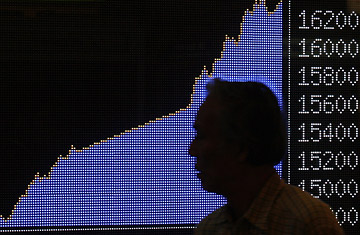
A man walks past a panel displaying the benchmark Hang Seng Index interday chart in Hong Kong October 13, 2008.
After record losses last week, Asian stock markets clawed back ground Monday as investors responded positively to details of a bailout plan for U.S. and European banks.
The MSCI Asia Pacific index gained 7.7% after dropping 20% last week — the worst performance in its history.
Hong Kong's battered Hang Seng index bounced particularly strongly in afternoon trading, ending the day with a 10.2% gain. Stocks in Korea and Singapore also ended sharply higher, gaining 3.8% and 6.6% respectively. India's Sensex added 7.7%, while China's CSI 300 index, which measures both the Shanghai and Shenzhen exchanges, was up 4.12%. Japan's stock market, which last week suffered the worst rout in its history, was closed Monday for a holiday. "I think markets took a breath and will rebound in the next few days," says Sean Tsang, senior vice president of Polaris Securities in Hong Kong.
But the gains are tentative. Light trading volume in Hong Kong suggests that investors are holding back ahead of Wall Street's reaction to bailout plans. During an Oct. 10 meeting of G-7 finance ministers, European central bankers suggested they would follow Britain's lead by buying stakes in struggling banks and underwriting interbank loans. The U.S. Federal Reserve is also finalizing a plan to recapitalize the nation's bank in order to loosen frozen credit markets.
Despite interest-rate cuts last week in the U.S., Europe and Asia, businesses throughout the world are finding it nearly impossible to borrow and money-market rates remain abnormally high. In Hong Kong, for example, the one-month interbank offered rate, the benchmark for short-term bank lending, rose to 5% last week even as the city cut its policy rate from 3.5% to 2.5%. Banks remain leery of lending in the face of further financial-industry failures.
The credit crisis is hurting even small Hong Kong businesses, according to Danny Lau, chairman of the Hong Kong Small and Medium Enterprise Association. "Bankers are tightening loans," Lau says. "That will affect most small businesses. Some of them have loans from banks in order to run their operations. Now they will have to tighten up, or they will have to contract in the future." Last week, U-Right, a clothing retailer with about 100 outlets in Hong Kong and another 500 in China, was forced to liquidate after it could not meet bank demands to repay its debts. By Sunday, some of the chain's Hong Kong stores, already picked over by bargain hunters, were shuttered.
Lau says that some small businesses have also been harmed by their investment in so-called "mini-bonds," complicated structured financial products marketed throughout the world by now-failed Lehman Brothers. Hong Kong banks allegedly sold investors the mini-bonds as a relatively low-risk alternative to fixed-income investments. When Lehman Brothers collapsed in mid-September, the derivatives lost much of their value. Companies that invested their deposits in them now find themselves unable to cover the difference, Lau says.
As the economic crisis tightens the screws on the city, both individual investors and Hong Kong businesses are appealing to the government for help. Pensioners who invested in Lehman mini-bonds have staged a series of protests during the last three weeks. And on Sunday, a group of business owners, organized by Hong Kong's pro-business Liberal Party, appealed to the government to increase loans for small businesses to cover short-term operational costs. "In Korea, Japan, even Singapore, they have lots of support from the government if you're running a new business. They'll back you up," says Lau of the small-business association. "In Hong Kong, no way. If you open a new business, there's nobody looking after you."
Business owners may get some comfort on Oct. 15, when Hong Kong Chief Executive Donald Tsang is expected to detail the city's plan to deal with the economic crisis. Hong Kong's Monetary Authority has already said that it may use the city's $160 billion in foreign currency reserves to help shore up its financial sector.
But those are only short-term fixes. For export-oriented Asian economies, the specter of a protracted U.S. recession remains daunting. Tommy Lam, owner of a garment factory in Dongguan, a Chinese city near Hong Kong, says that he has already seen a reduction in demand. "We're not getting the repeat orders we're supposed to get," Lam says.
Lam says his company, which makes coats for export, is in solid financial shape and will likely fare better than low-cost competitors. But securing credit remains a major problem for Hong Kong's small business community. "Right now we're facing trouble," he says. "The banks are advising us that they may have to tighten our credit. They're giving letters to warn us they may cut our credit in the future."
(Click here to see photos of how London faces painful and uncertain times.)
